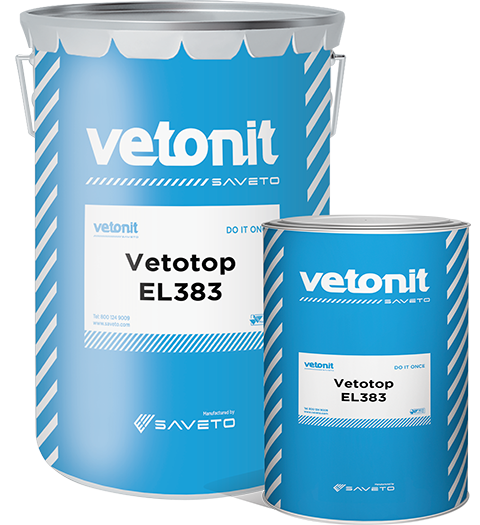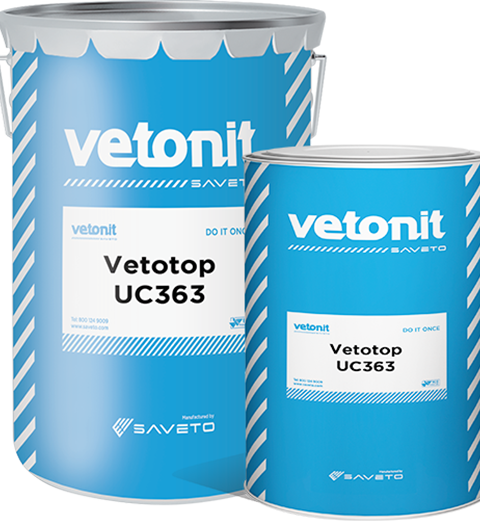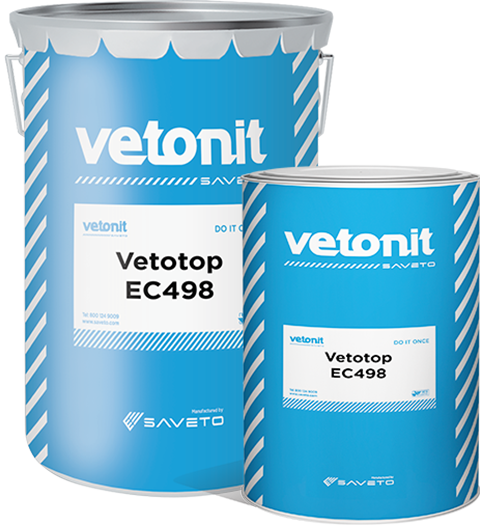ڤيتوتوب اي ال 383
طلاء أرضية إيبوكسي ذاتي الاستواء 1-2 مم
<p>Vetotop EL383 is a two-component, solvent-free, conductive, epoxy flooring system that consists of an insulating primer, self-adhesive conductive tape, conductive primer, and a conductive top layer with excellent abrasion and chemical resistance. It’s ideal to create anti-static floors when controlling static electricity is needed. For example, in hospital operating rooms, cleaning rooms, and in hazardous & chemical environments.</p>

Uses
- In flammable gas-handling locations.
- In aerospace and defense facilities.
- In hospitals & operating theaters.
- In pharmaceuticals & solvent-handling areas.
- In automobile assembly areas.
- In IT server & data storage rooms.
- In telecommunication control rooms.
Advantages
- Self-smoothening consistency.
- Protects sensitive electronic parts from the effects of static charges.
- Prevent explosions due to sparks of accumulated static charges.
- Excellent adhesion to concrete and cement screed substrates.
- Conductive & anti-static floor overlay system.
- High mechanical and anti-static properties.
- Extremely resistant to various chemicals such as alkalis, diluted acids, brine, mineral oil, lubricants, and fuels.
- Available in a wide range of attractive colors.
Usage Instructions
The surface should be sound, clean, free from loose material, grease, laitance, dirt-curing compounds, etc. Laitance and weak surface layers must be removed using mechanical methods such as grinding or blasting to provide a sound, well-profiled surface.
Materials should be preconditioned at 25°C to reduce the possibility of flash and slow setting. Make all necessary repairs before applying by using an epoxy mortar from the Vetorep ER range.
New concrete floors should be at least 28 days old with a moisture content of less than 5% (for earlier applications, test the moisture conditions of the substrate).
Prime the substrate with Vetoprime EP491 before the application of Vetotop EL383.
Mix Vetoprime EP491 in the proportions recommended by Saveto. Add the entire contents of the hardener container to the base container. When thoroughly mixed, preferably using a slow speed mixer, apply the primer in a thin, continuous film using rollers or a stiff brush.
Work the primer well into the concrete’s surface (avoid ponding or over application). Leave the primer to achieve a tack-free condition before applying Vetoprime EP381.
After Vetoprime EP491 dries, fix self-adhesive conductive tape over the primed surface. Mix Vetoprime EP381 as per the mixing instructions of Vetoprime EP491. Apply Vetoprime EP381 at a rate of 8-10 m2/liter in a single coat.
Consult Saveto technical representative for proper installation procedure as per the established norms and guidelines for optimum connectivity and results.
Vetotop EL383 is supplied in two pre-weighed packs (base and hardener), ready for immediate on-site use. Do not mix partial quantities as it will affect both the finished floor’s performance and appearance.
Carry out the mixing using either a forced action mixer or a heavy-duty mobile mixer fitted with a jiffy-type mixing paddle. All such equipment should be of a type and capacity approved by Saveto. Mix the components in a suitably sized mixing container.
Stir the base and hardener components individually, then empty the components into the mixing container (we recommend scrapping the edges) and mix for 2 minutes. Slowly Add the filler pack content and mix for another 3 minutes until the mixture is completely homogeneous.
Ensure sufficient labor and materials to make the mixing and the subsequent application process a continuous one for any given, independent floor area.
Once the components are mixed, use the material within its specified pot life. Pour the material onto the prepared and primed substrate as soon as mixing is complete. Spread it to a thickness of 1.5 - 2 mm using a notched trowel or a gauged spreader. Do not overwork the resin and spread it evenly and slowly.
After laying, roll the material immediately, using a spiked nylon roller to remove slight trowel marks and assist air release. Use a ‘back and forth’ technique along the same path for rolling. An overlap of 50% with adjacent paths is recommended. Further light rolling may be required to remove surface imperfections or for subsequent release of trapped air (This should be done before the product begins to set).
Remove Vetoprime EP491, Vetoprime EP381, and Vetotop EL383 from tools and equipment with Vetonit Solvent XX400 immediately after use. Remove hardened material mechanically.








